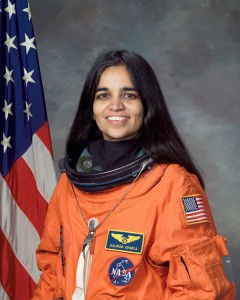Asian and Pacific Heritage Month: Kalpana Chawla
May is Asian American and Pacific Islander (AAPI) Heritage Month. All month long, Behind the Headlines will feature AAPI pioneers in a variety of areas.
In 1997, the American astronaut Kalpana Chawla (1962-2003) became the first Indian-born woman to travel into space. Chawla served on two missions aboard the United States space shuttle Columbia as a mission specialist and robotic arm operator.
Chawla was born on March 17, 1962, in Karnal, northern India. Karnal was part of the state of Punjab at that time. Today, it is part of the state of Haryana. She graduated from the Punjab Engineering College in 1982. That same year, she immigrated to the United States. In 1984, she earned a master’s degree from the University of Texas in Austin. She married Jean-Pierre Harrison, an aviation teacher and author, in 1983. She received her doctorate in aerospace engineering from the University of Colorado at Boulder in 1988. She then went to work at the National Aeronautics and Space Administration (NASA). In 1994, she was selected for training as an astronaut candidate.
In 1997, Chawla flew her first mission on the shuttle Columbia. She was the second person of Indian descent to travel in space, following the Indian-born cosmonaut Rakesh Sharma, who traveled on a Soviet Soyuz spacecraft in 1984. Chawla’s duties involved conducting experiments in microgravity, sometimes called zero gravity or weightlessness, and launching a satellite using the shuttle’s robotic arm. Her second mission was on the same shuttle in 2003. However, on Feb. 1, 2003, as the Columbia was returning to Earth after the 16-day mission, the spacecraft broke apart high over Texas. Chawla and six other crew members were killed.
Chawla received many honors for her work in space. They include the Congressional Space Medal of Honor, the NASA Space Flight Medal, and the NASA Distinguished Service Medal. In addition, an asteroid that orbits the sun between Mars and Jupiter is named the 51826 Kalpanachawla in her honor.



